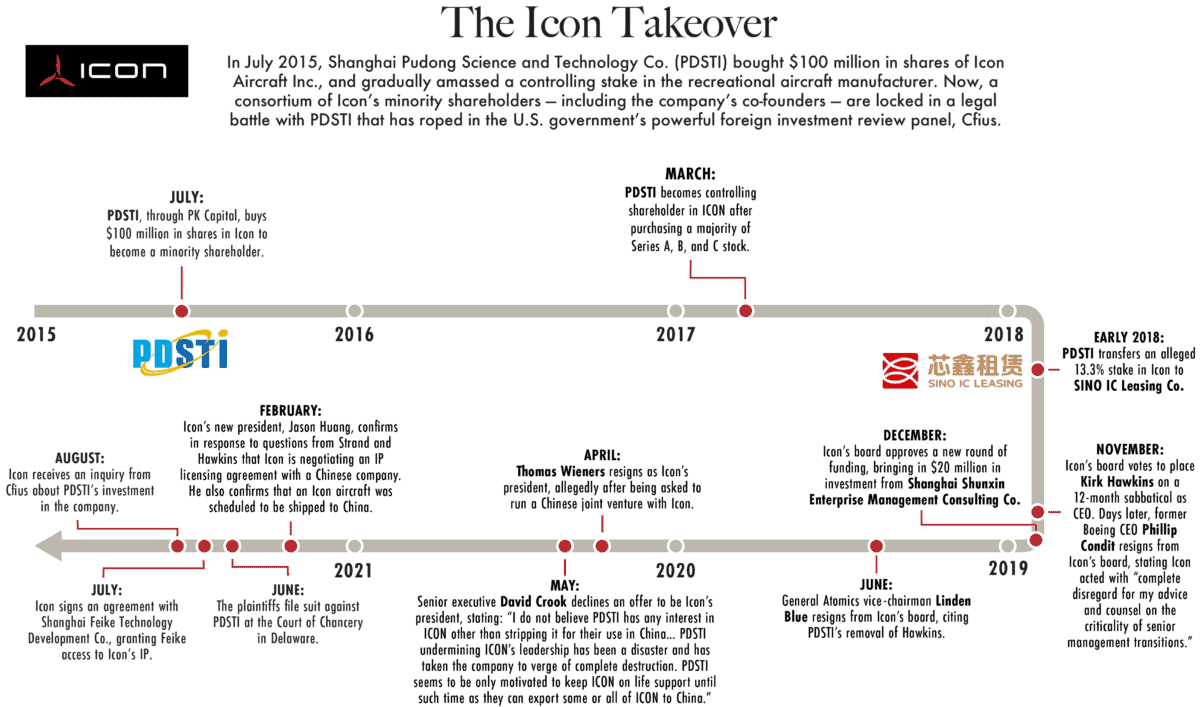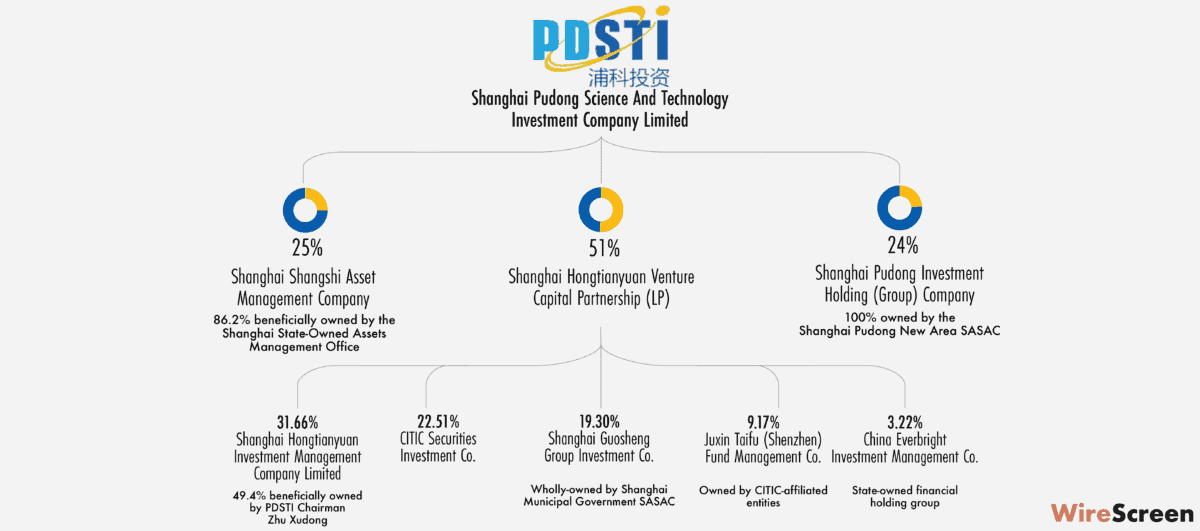
For flying enthusiasts, the Icon A5 plane looks like a dream toy. The two-person aircraft, which costs around $300,000, can land on water while its folding wings make it easy to pack up into a trailer.
But the A5’s maker, Icon Aviation Inc., is currently at the center of a bitter dispute between some of its minority shareholders and its biggest investor, China’s state-owned Shanghai Pudong Science and Technology Investment Co. (PDSTI). The minority shareholders alleged in a Delaware court last June that PDSTI has hobbled Icon’s development while planning to transfer its technology — which, they say, could have military applications — back to China.
The dispute has reportedly drawn the attention of the Federal Bureau of Investigation and the Committee on Foreign Investment in the United States (Cfius), which reviews foreign investments for national security concerns. Its interest is in turn the latest sign of the sensitivity around any Chinese investment in American companies that could have implications for the two countries’ growing rivalry over advanced technologies.
This week, The Wire takes a closer look at the dispute over Icon Aircraft, examining PDSTI’s background and its investments in the company.

PDSTI’S INVESTMENT
Icon was founded in 2006 by Kirk Hawkins, a former Air Force pilot, and Steen Strand, a Stanford University product design instructor. The company’s prototype aircraft attracted attention from enthusiasts and drew investment from prominent venture capitalists, including Eric Schmidt, the former Google CEO, according to data from PitchBook. Several respected aviation industry figures have sat on the company’s board, including Linden Blue, co-owner of General Atomics, the U.S. defense contractor that makes the Predator drone; and Philip Condit, a former CEO of Boeing.
PDSTI became a minority shareholder in Icon in July 2015, after investing $100 million in the company. The Chinese company, which invested through a Cayman-registered subsidiary, is majority state-owned: three of its four largest beneficial shareholders are Shanghai government entities, according to WireScreen. Its founder and chairman is Zhu Xudong, who previously served in several positions in the Shanghai Municipal Government. Zhu joined Icon’s board in September 2015.
Lawyers representing PDSTI declined to comment for this article.
By October 2017, PDSTI had amassed a controlling stake in Icon, according to a filing by the plaintiffs in the Delaware suit. PDSTI brought in a new Chinese investor, Sino IC Leasing Ltd., several months later, and allegedly transferred a 13.3% stake in Icon to Sino, reducing its own stake to 46.7%, also according to the plaintiffs’ filings. PDSTI, which kept 6 of Icon’s 11 board seats, then allegedly began appointing new directors while putting pressure on the board’s existing members to vote in line with its representatives.
The brewing conflict between Icon’s CEO and founder and the company’s Chinese investors came to a head in November 2018, when the board voted to place Hawkins on a 12-month sabbatical. At the time, Hawkins was negotiating a buyout by Yamaha Motor Company, which would have required PDSTI to cede its controlling stake, according to the plaintiffs’ filings.
PDSTI has defended its move to push Hawkins out in its own court filings, arguing that “since 2015, PDSTI has invested hundreds of millions of dollars into Icon equity and debt, and successfully sourced other outside investors who have made investments in the tens of millions of dollars, and still Icon has failed to achieve profitability under Hawkins’ disastrous leadership.”
Days after the vote to remove Hawkins, Condit, the former Boeing CEO, resigned from the board. Blue, the vice chairman of General Atomics, resigned eight months later, citing PDSTI’s removal of Hawkins.
Condit and Blue could not be reached for comment. Hawkins did not respond to a request for comment.
With Hawkins out as CEO, PDSTI moved forward with plans to transfer Icon’s technology to China, according to the plaintiffs’ court filings. In May 2020, Zhang Min, an Icon board member appointed to a seat controlled by PDSTI, informed Icon executives that he was working to establish a joint venture with an unnamed Chinese partner that would gain access to Icon’s technology. An Icon A5 plane was shipped to China 10 months later. In July 2021, Icon signed an agreement with Shanghai Feike Technology Development Co. granting Feike access to Icon’s intellectual property. By then, the plaintiffs in the Delaware lawsuit had filed suit against PDSTI.
“Once Icon’s intellectual property is transferred to China, Icon will lose control of this intellectual property, and all value associated with Icon in the United States will be destroyed,” said the complaint filed by the plaintiffs.
PDSTI has defended the move to transfer Icon’s technology: “Given Icon’s desperate need for capital and challenges to raising more, starting in late 2020 the company sought to fund its operations through an IP licensing agreement with [Feike],” it said in court filings.
ICON’S LICENSEE

Company ownership records show how Shanghai Feike, Icon’s IP licensee, is related to Sino IC Leasing Co. and PDSTI. Feike is a wholly owned subsidiary of Shanghai Feiren Technology Company. Sino, which allegedly owns 13.3% of Icon, indirectly holds a controlling stake in a major Feiren shareholder. Majority state-owned Sino is also backed by a number of powerful companies and investors in China’s semiconductor sector, including the National Integrated Circuit Industry Investment Fund (also known as the ‘Big Fund’), Tsinghua Unigroup and top Chinese chipmaker SMIC, which is on the U.S. export control list.
Another major shareholder in Feiren is Shang Gong Group, a listed manufacturer of sewing equipment and office supplies. Shang Gong Group’s chairman is Zhang Min, the Icon board member who first informed company executives about plans to transfer Icon’s technology to a Chinese partner. PDSTI holds an indirect 10.94% stake in Shang Gong Group, making it its single largest shareholder.
NATIONAL SECURITY?
Icon’s founder Hawkins claimed in comments made to Flying Magazine last month that there is an unspecified active program working on the militarization of the A5 aircraft as an unmanned aerial vehicle. The magazine also spoke to Mark Gamache, the CEO of XQT Aero, who claims to have received a contract from the U.S. Navy for an experimental development program aimed at converting the Icon A5 into a UAV. XQT Aero’s website describes the company as an “emerging small business focusing on aerospace technology and services.” Gamache, whose LinkedIn profile describes him as a former executive director at Northrop Grumman, declined to comment for this article.
Still, any move by Cfius to retroactively block PDSTI’s investment in Icon would be highly unusual, experts say. And some also question whether the Chinese investors’ stakes in Icon present a threat to the U.S. Most general aviation companies don’t utilize advanced technologies of significant value for national security, according to Chad Ohlandt, a senior engineer at the RAND Corporation and author of a 2019 report on Chinese investment in U.S. aviation.
That doesn’t mean he is unconcerned. “Even if it’s all above board and doesn’t violate Cfius, the bottom line is that you have a predatory Chinese provincial-level government that is using money to buy access to businesses or technology in the U.S.,” says Ohlandt. “Ultimately, what you’ve done is allowed the city of Shanghai to purchase a thousand North American jobs, and now they’re trying to relocate those jobs and technologies back to Shanghai…That’s not necessarily a national security concern, but it is an economic security concern.”
These are PDSTI’s biggest investors:


Eliot Chen is a Toronto-based staff writer at The Wire. Previously, he was a researcher at the Center for Strategic and International Studies’ Human Rights Initiative and MacroPolo. @eliotcxchen



